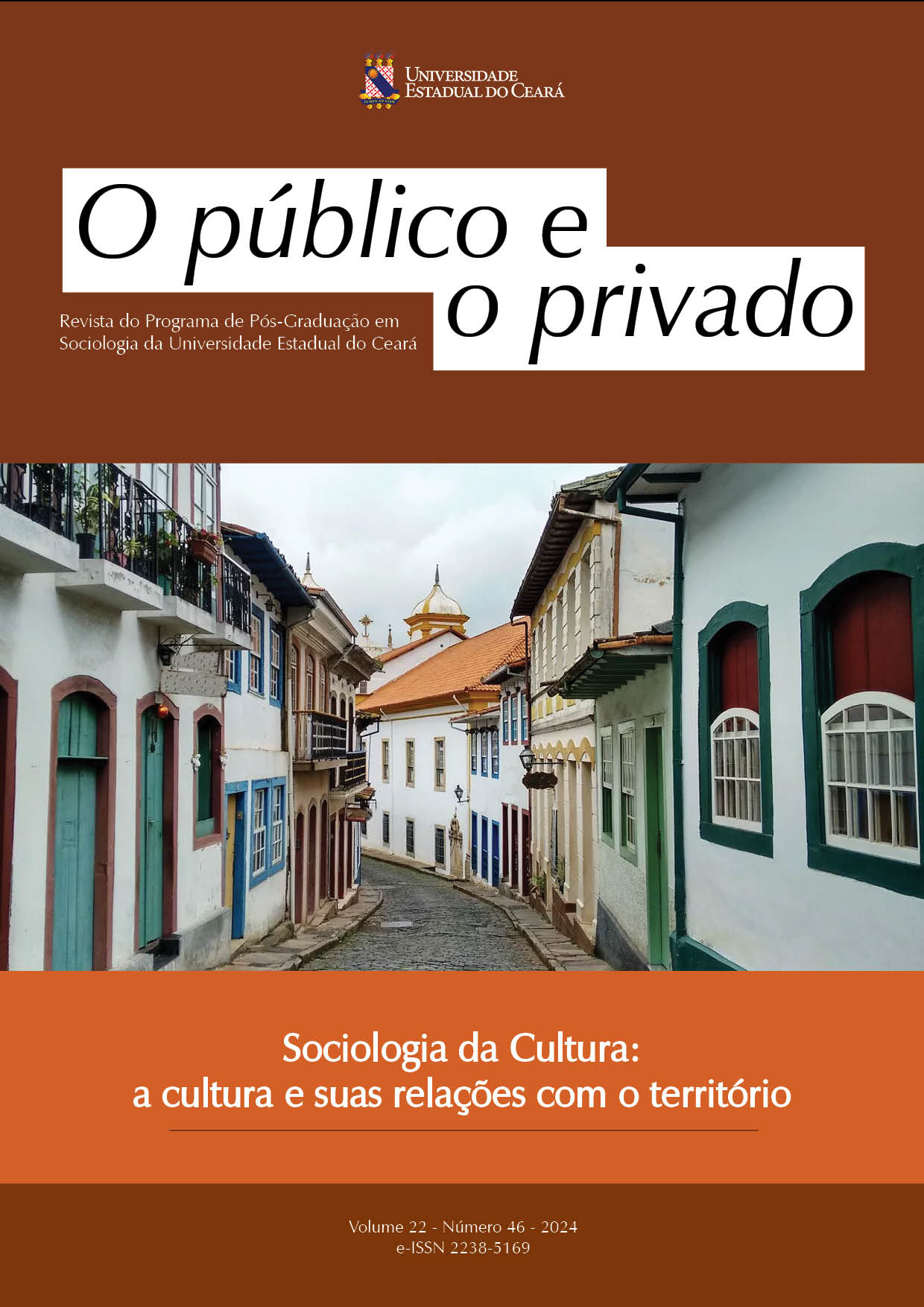Cultura Viva Conceito-Fronteira
as redes de pontos de cultura do estado de Goiás
DOI:
https://doi.org/10.52521/22.11914Palavras-chave:
Pontos de Cultura em Goiás, Cultura Viva, Conceito-FronteiraResumo
Por meio da etnografia dos arquivos, este artigo busca apresentar a trajetória da implementação das Redes Cultura Viva no Estado de Goiás e como a partir dessa incursão a invenção da política cultural começou no estado. Para isso essa investigação utiliza o levantamento de dados dos processos presentes na plataforma Plataforma TransfereGov com recorte de tempo de 2005 a 2017 em que teve como convenente o órgão federal da cultura, estado, munícipios e instituições sem fins lucrativos. Enquanto conceito-fronteira, a Cultura Viva se relaciona entre os interesses do estado em constituir políticas culturais e as demandas da comunidade de apenas não receber cultura, mas, de ser produtora de suas estéticas e dos seus modos de criação artistico-cultural. Em base comunitária, a Cultura Viva inventa a política cultural em Goiás e no Brasil.
Referências
BRASIL, Constituição da República Federativa do Brasil. Brasília: Supremo Tribunal Federal, Secretaria de Altos Estudos, Pesquisas e Gestão da Informação, 2023.
________, Política Nacional de Cultura Viva. Lei 13 018/2014. Disponível em< http://www.planalto.gov.br/ccivil_03/_ato2011-2014/2014/lei/l13018.htm> acesso em 28 setembro. 2023.
GONZÁLEZ CASANOVA, Pablo. Sociedad plural, colonialismo interno y desarrollo. Revista América Latina. Revista do Centro Latinoamericano de Ciencias Sociales, ano VI, n. 3, julho-setembro, p. 15-32, 1963.
CÉSAIRE, Aimé. Discurso sobre o Colonialismo. Lisboa: Livraria Sá da Costa Editora, 1978.
COSTA, Maria Cristiana Castilho. Etnografia de arquivos: entre o passado e o presente. MATRIZes, v. 3, n. 2, p. 171- 186, 2010. Disponível em < https://core.ac.uk/download/pdf/268325175.pdf >
CUNHA, Olívia Maria Gomes da. Tempo imperfeito: uma etnografia do arquivo. Mana, v. 2, n. 10, p. 287-322, 2004.
______ Do ponto de vista de quem? Diálogos, olhares e etnografias dos/nos arquivos. Estudos Históricos, v. 2, n. 36, p. 7-32, 2005. Disponível em:<https://bit.ly/2MkdeK0>
LOPES, Luma Louise Sousa; IPIRANGA, Ana Silva Rocha. Etnografando Arquivos Históricos: Caminhos Possíveis para Pesquisas em Estudos Organizacionais. Revista Organizações & Sociedade, v. 28, n. 96, p. 35-56, 2021.
MIGNOLO, Walter. Desafios decoloniais hoje. Revista Epistemologias do Sul, v. 1, n. 1, p. 12-32, 2017.
NUNES, Ariel. Por um Do in antropológico " - Pontos de Cultura e paradigmas nas políticas públicas culturais. 2012. 100 f. Dissertação (Mestrado em Antropologia Social) - Universidade Federal de Goiás, Goiânia, 2012.
OPCULT. Programa Cultura viva: impactos e transformações sociais / Organizadores: Hugo Leonardo Ribeiro, Mário Lima Brasil.- Brasília: UnB, 2016.
RUBIM, Antonio Albino Canelas. Políticas culturais no Brasil: tristes tradições. Revista Galáxia, n. 13, p. 101-113, jun. 2007.
_______; ALMEIDA, Juliana; METTENHEIM, Sofia. Federalismo e Políticas Municipais de Financiamento à Cultura no Brasil. In: Gestión Cultural Local: Investigaciones y Experiencias Manizales, Chile, septiembre de 2023.
SANTINI, Alexandre. “Cultura Viva e a construção de um repertório comum para as políticas culturais na América Latina”. IberCultura Viva, 2015
SILVA, M. D. de C. Fazendo etnografia no arquivo: desafios e possibilidades. Revista do Instituto Histórico e Geográfico de Sergipe, v.1, n. 48, p. 75-86, 2018. Disponível em: https://seer.ufs.br/index.php/rihgse/article/view/12170
SILVA, Raoni. ARAUJO, Mona Lisa. Uma antropologia no arquivo. REIA- Revista de Estudos e Investigações Antropológicas, v. 5, n. 1, p. 47-57, 2018.
SILVA, Frederico A. Barbosa da. ARAÚJO, Herton Ellery. Cultura Viva: Avaliação do Programa Arte Educação e Cidadania. IPEA, Brasília, 2010.
TAKAIÚNA. Ser Comunitário: um exercício para crianças e adolescentes. Disponível em: http://trupedetruoes.com.br/wp-content/uploads/2020/10/Takaiuna-Correa-e-Pablo-Lopes.pdf
TURINO, Célio. Ponto de cultura :o Brasil de baixo para cima. São Paulo: Anita Garibaldi, 2010.
Downloads
Publicado
Como Citar
Edição
Seção
Licença
Copyright (c) 2024 Pablo Lopes

Este trabalho está licenciado sob uma licença Creative Commons Attribution 4.0 International License.











